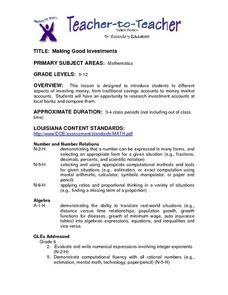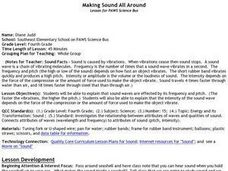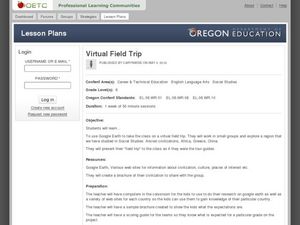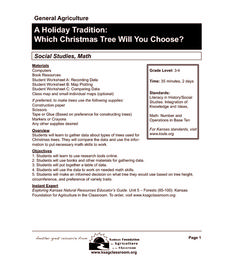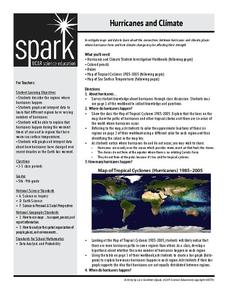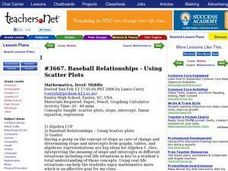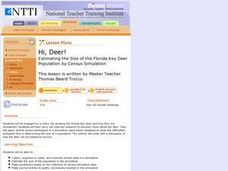Curated OER
Making Good Investments
Students compare different aspects of investing money from traditional savings accounts to money market accounts. They research investment accounts at local banks and compare them.
Curated OER
Making Marbles
Learners perform a simulation in which they work for a toy company and have to figure out how many marbles of different sizes can be made with the provided material. They must design their own experiment to figure this out.
Curated OER
Energy Choices
Young scholars figure the best gas prices. In this math lesson, students add and multiply with decimals. Young scholars complete a worksheet to find which supplier offers the best gas prices.
Curated OER
Lemonade Stand: Making Money the Old-Fashioned Way
Students run their own lemonade stand and are to figure out what to sell the lemonade at to gain the maximum profit.
Curated OER
Making Sound All Around
Fourth graders examine how sound waves are effected by frequency and pitch. They conduct experiments using tuning forks, rubber bands, balloons, and water, and answer questions about the experiments.
EngageNY
Normal Distributions (part 1)
Don't allow your pupils to become outliers! As learners examine normal distributions by calculating z-scores, they compare outcomes by analyzing the z-scores for each.
Towson University
Mystery Tubes
How do scientists know they're right? Truth be told, they don't always know. Explore the scientific process using mystery tubes in an insightful activity. Young scientists discover how to approach and solve problems in science, how ideas...
Rochester Institute of Technology
Hazmat Disposal
What a waste! The last installment of a nine-part technology/engineering series teaches learners about medical waste disposal systems. Conducting a simulation allows individuals to understand how monetary considerations constrain waste...
Towson University
Case of the Crown Jewels
Can your biology class crack the Case of the Crown Jewels? Junior forensics experts try their hands at DNA restriction analysis in an exciting lab activity. The lesson introduces the concept of restriction analysis, teaches pipetting and...
Serendip
Understanding and Predicting Changes in Population Size – Exponential and Logistic Population Growth Models vs. Complex Reality
Salmonella poisoning impacts over 200,000 people in the United States each year. Scholars learn about the growth of these bacteria using multiple approaches. Then they apply the same growth calculations to endangered species and think...
Kenan Fellows
Reading Airline Maintenance Graphs
Airline mechanics must be precise, or the consequences could be deadly. Their target ranges alter with changes in temperature and pressure. When preparing an airplane for flight, you must read a maintenance graph. The second lesson of...
Towson University
The Wildlife Forensics Lab
Can science put an end to the poaching of endangered species? Show your young forensic experts how biotechnology can help save wildlife through an exciting electrophoresis lab. Grouped pupils analyze shark DNA to determine if it came...
Curated OER
Virtual Field Trip
This hands-on resource has future trip planners analyze graphs of mileage, gasoline costs, and travel time on different routes. While this was originally designed for a problem-solving exercise using a Michigan map, it could be used as a...
Curated OER
Interactivate - Geometry in Tessellations
Students use an on-line worksheet to experiment with patterns of tessellations in regular polygons. As students observe different shapes in the "Tessellate" Activity they complete a data table and practice making predictions for...
Curated OER
Hairy Evidence! Hair Identification
Provide a mystery hair and a set of reference hair samples for middle school investigators to place on a slide and examine under a microscope. Materials and procedures are detailed on the first page, while a data table for drawing what...
Agriculture in the Classroom
A Holiday Tradition: Which Christmas Tree Will You Choose?
Different varieties of Christmas trees provide an interesting way to combine social studies, science, math, and technology. Class members not only research the history of the Christmas tree holiday tradition, they compare and contrast...
American Chemical Society
Using Color to See How Liquids Combine
Blue-tinted water is added to unknown liquids that have been tinted yellow to find out how they interact. This is a memorable activity that is part of an investigation on the properties of liquids, which is part of a unit on the...
American Chemical Society
Comparing the Amount of Acid in Different Solutions
Upcoming chemists use chemical reactions to determine relative pH in two different acids. This is a terrific lesson plan for middle schoolers that can stand alone as a practice in precision and lab skills, or as part of the unit on...
Center Science Education
Hurricanes and Climate
Feeling under the weather? This lesson on hurricanes can whip things up! With professionally designed maps and handouts, teach your future weathermen (or women) where, when, and how hurricanes occur. They identify hurricane regions and...
Curated OER
Basketball And Mathematics
Eighth graders collect and analyze data about foul shots taken at basketball games.
Curated OER
Survey and Tally
Second graders view a model of a survey and tally. In this survey and tally lesson plan, 2nd graders decide on questions for a survey. Students conduct the survey and tally their results. Students create a tally chart. Students view a...
Curated OER
Excel temperature Graphs
Students gather data about the weather in Nome, Alaska. In this Nome Temperature lesson, students create an excel graph to explore the weather trends in Nome. Students will find the average weather and add a trend line to their graph.
Curated OER
Baseball Relationships - Using Scatter Plots
Students use graphing calculators to create scatter plots of given baseball data. They also determine percentages and ratios, slope, y-intercepts, etc. all using baseball data and statistics.
Curated OER
Hi, Deer!
Students collect, organize by table, and examine census data in a simulation, estimate the size of the population in the simulation and make predictions based on the collection of census simulation data.


